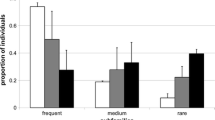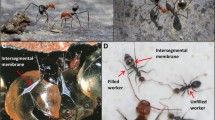Abstract
Honeybee colonies reproduce by colony fission and swarming. The primary swarm leaves the nest with the mated mother queen. Further “after-swarms” can leave the nest. These are composed of virgin queens and sister workers. Since all workers in the primary swarm have the same relationship to the mother queen, kin recognition cannot have any effect on the worker distribution in the swarm. Because of polyandry of the mother queen, the after-swarm is composed of super- and halfsister workers of the virgin queen. In this case kin recognition might affect swarm composition if workers increase their inclusive fitness by preferentially investing in a supersister queen. The distribution of workers in the mother colony, the primary and the after-swarm was analyzed using single-locus DNA fingerprinting in two colonies of the honeybee (Apis mellifera). The colonies were composed of 21 and 24 worker subfamilies because of multiple mating of the queen. The subfamily distribution in the mother colonies before swarming was significantly different from the subfamily frequencies in the primary swarm. This indicates different propensities for swarming in the various subfamilies. The subfamily distribution was also significantly different between the mother colony and the after-swarm. There was however no significant difference between the subfamily composition of the primary and the after-swarm. The average effects of kin recognition on the distribution of the subfamilies in the two after-swarms were less than 2%. We conclude that colony-level selection sets the evolutionary framework for swarming behaviour.
Similar content being viewed by others
Author information
Authors and Affiliations
Additional information
Received: 22 May 1996 / Accepted after revision: 2 November 1996
Rights and permissions
About this article
Cite this article
Kryger, P., Moritz, R. Lack of kin recognition in swarming honeybees ( Apis mellifera ). Behav Ecol Sociobiol 40, 271–276 (1997). https://doi.org/10.1007/s002650050342
Issue Date:
DOI: https://doi.org/10.1007/s002650050342




